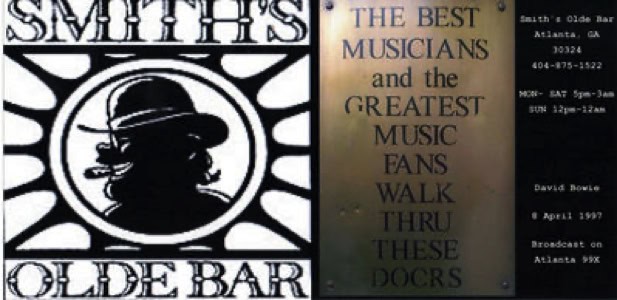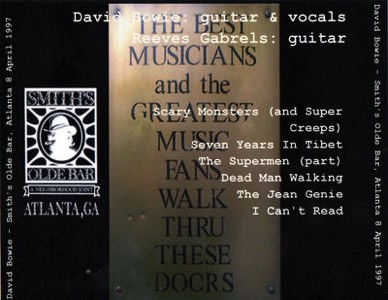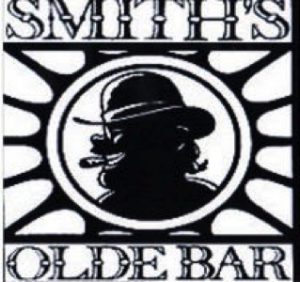David Bowie 1997-04-08 Smith’s Olde Bar (Atlanta FM Broadcast) (9:15 in the morning) .
Sound Quality Rating
01. Talk.flac
02. Scary Monsters.flac
03. Talk.flac
04. 7 Years In Tibet.flac
05. Talk.flac
06. Jimmy’s Riff.flac
07. Dead Man Walking.flac
08. Talk.flac
09. Jean genie.flac
10. Talk.flac
11. I Can’t Read.flac
12. Thank Yous.flac
Label : No label
Audio Source : FM Broadcast)
Lineage : Unknown
Total running time : 0:53:00
Sound Quality : Excellent quality! Equals record or radio
Attendance : Unknown
Artwork : Yes


This is currently only half of the transcript
Barnes: Morning X, we are live at Smith’s Old Bar. We are very, very proud to introduce as part of our anniversary series, anniversary week: Ladies and Gentlemen, David Bowie.
Jimmy: Wow, is this surreal or what. Welcome David.
[cheers]
db: Hi, how are you?
[cheers]
Jimmy: Your background singers.
[cheers]
Barnes: So Leslie Fram, how does that feel sitting next to db?
db: Fine.
Leslie: This is uh…
db: Did anyone mention that’s Reeves Gabrels over there.
[cheers]
Barnes: All alone.
db: Use the microphone, they use mikes these days Reeves.
Barnes: David I don’t know if you can tell, but people are a little excited.
db: I’m real excited.
Jimmy: You guys were on Letterman the other night and backstage we were talking. Is there some question between the two of you about wardrobe because it seemed like…
db: Just hair products.
Jimmy: We were teasing Reeves a little bit about his pants.
db: No, just hair products.
Jimmy: Just hair products.
db: Yeah. But when my product, then I tease him about the lime green pants.
Jimmy: Uh huh.
Barnes: Liv Tyler seemed to have a problem breathing around you. What’s that going on backstage too.
db: “She,” had problems breathing?
Barnes: And making complete sentences.
db: I said “I came up with a real sophisticated line.” I said “Boy, have I got a son for you.” “He’s like 26 now, so I think it’s a perfect match.”
Barnes: You guys have never passed? You’ve never seen her backstage somewhere? It seems that in the circles you run she may be around somewhere like as a kid.
db: hmmm. No, in fact the only kid that came out of rock and roll that I met was Dylan. Is it Jacob?
Barnes: Jacob?
Leslie: Jacob Dylan?
db: Jacob Dylan?! No, the other Dylan.
Barnes: His son Jacob?
db: Dylan Thomas.
ALL: Oh, Dylan Thomas.
Barnes: I thought you were going for the Jacob thing.
Leslie: David is this early for you? Do you normally get up this early?
db: He said “It feels like… what is it doing a proficiency examination at music school.”
db: What was it you told me that you went in with three judges?
Reeves: I was telling about playing a classical piece in front of three teachers and having one of them reach over and tuning my guitar while I was playing; which is not so different from now.
ALL: [laughing]
Barnes: I do see you though as keeping fairly normal hours. I don’t see you as like maybe we would have seen you twenty years ago. Up till 4 or 5 o’clock in the morning.
db: Well no. Occasionally we get out.
Jimmy: Occasionally?
db: Yeah we’ve been to a few raves recently to see what’s been happening out there. And they are way after 8 o’clock in the evening. So it kind of keeps you up.
Barnes: You get a couple of hours of sleep a night, huh?
db: Yeah.
Barnes: Then wake up and go out at 3 in the morning.
db: The thing that baffles me is that dance music is real popular in Europe of course. It’s kind of getting popular here and in Canada. But it’s like nobody can dance. Kids come up and say “What do you think of our singing David?” It’s great but no one can dance. Oh but the music is cool, I liked it yeah.
Jimmy: Do you still enjoy being famous?
db: I live for it.
Jimmy: Do ya?
db: The old, it’s a real stereotypical reply. And it’s true. The only thing it’s good for is getting a seat in a restaurant. I must be honest, it’s not.
Jimmy: You get right in and you probably don’t have to pay most of the time.
db: No, I just have to sing.
Jimmy: Sing for you meal?
db: Hey sign this. It’s not for me it’s for my mother. I get a lot of that.
Leslie: You just had a big birthday. That was an incredible concert. Did anybody see the concert?
[cheers]
Leslie: Who was on your, was there someone at the very top of the list, that you really wanted to be there?
db: You know that it was very strange. I put down the list of people, of about 20 to 30 people that I would’ve approached to do the show. In all reality, the first 6 I pick off I got immediately. So I was almost hemmed in by my own choice. So I just took the first 6 off the top of the list. That was Lou and Robert and all the rest of the guys. But I had on the list, I’m hoping we may well do it again. It went down so well, the whole ideal of it, that we might. It was for Save the Children’s Fund. We might be doing it again next year, on the 8th, at Madison again. And we’ll get, I’ll keep going down the list.
Barnes: You just keep having 50th birthday parties huh?
db: Always 50, yeah.
Barnes: Always at 50, steady and holding. The new album David’s got, the new album Earthling. Don’t know if you know. Pretty jammin’ techno. You take a turn every album. I mean, this album is like…
db: I don’t know whether you are listening, but we kind of got involved in it on “Outside.” A few tracks on that. And I’ve been working with techno stuff. On “Black Tie White Noise Album” in 1992 I had Junior {Slade 808} do some mixes for me. Vasquez. I’ve been kind of wanting to move into that area for sometime. But this is the first time that we’ve been so overtly concerned with that particular vocabulary. For life it’s just great, a great buzz festival of life right now.
Barnes: Yeah on Letterman it seemed like it. The band was thumpin’.
db: Yeah this is a good band.
Barnes: How does it cross over with you guys doing it with acoustic guitars? That’s going to be an interesting different sound, huh?
db: You can be the judge of that. Do you want us to play some?
[cheers]
db: Do you want to fill in while I switch microphones?
Jimmy: Second-hand… nah.
Barnes: You guys want him to play?
[cheers]
Barnes: Okay, we’ve twisted his arm.
db: While in the late 50’s early 60’s I was spending time in penitentiary on a bank robbery charge. One of the guys I met in there was an up and coming country and western singer named Johnny Cash.
[cheers]
db: Where am I going with this?
Barnes: I know right where you are going.
db: So this is a little thing that we wrote in the cell there and we’re going to attempt to do it. It’s called “Scary Monsters.”
[Country Version – Scary Monsters]
[Cheers]
Jimmy: Man this is like surreal. I’m sitting there going “That’s db, we’re in Smith’s Old Bar, what a great anniversary present. Thank you David.
db: A little later on we’ll do “Ashes to Ashes” as a tango.
Barnes: I say you get into that little move on Letterman the other night.
db: Yeah, we’ve tried them as a waltz, a march…
Jimmy: Are there any other styles of music that you would still like to try?
db: Funny thing about country and western.
Barnes: That’s you’re next step.
db: Buddy Rich. Buddy Rich had a heart operation in the 50’s. And as he was going into the theater to get jacked up for the operation the Dr. said “Is there anything that you are particularly allergic to?” Buddy Rich says “Yeah, country and western.”
Barnes: Where’s home now David? Where do you live? Where do you call home?
db: Well at the moment it’s really I’m spending a lot of time in America. So I guess it would be America at this particular time.
Barnes: Are you out in L.A. or in New York?
db: I’m more in the East Coast; I must be honest.
Barnes: More East Coast. So you’re an East Coast rapper?
db: Yeah, I like. I feel at home. I like the East Coast.
Jimmy: David, we had listeners faxing questions and now I have to tell you, we had over a thousand. I mean trying to whittle it down to a few. So we’re going to get to just about 750.
db: Well you better get started.
Jimmy: Well, you know, if you want to do more, we can do more. So these are just some of the listeners.
db: What’s the capitol of…?
Jimmy: Where were you during the fall of Saigon David? Leslie, want to go?
Leslie: Yeah. This one actually we’ve been wondering about for a while. To talk a little bit about the whole stock market thing and your catalogue.
db: Well my advice is if you want a blue chip investment.
Jimmy: Is that the kind of thing you want as a blue chip?
db: What do you want to know?
Barnes: How does it work? I mean I would like a 100 shares of Bowie please. I mean are we buying like…
db: It was actually, it was very in house. It was a Wall Street deal and it was particularly cited for that. You see the thing is, when you’ve a catalogue. And I guess with my sort of longevity, it’s like 30 years of stuff. The usual thing to do is that you sell it off to a major record company. And they keep issuing it out again in various forms. And you never get it back again. Your family never gets it. It goes for perpetuity and I wanted to find out a way that I could do it so that I could get what I have done, what I have written, come back to me at some point.
Barnes: What is your trading symbol?
db: We don’t have one.
Barnes; You go in and you want some Bowie stuff.
db: It’s gone already. It went out in 24 hours.
Barnes: It’s already done.
db: 24 hours, quite a thing. The thing is, I get it back in a few years, in 25 years time. So it goes back to my family again. And that’s a big perk for me. And a big deal…
Barnes: See, I bought all Marilyn Manson, so I have no money left.
db: Who?
Barnes: I made a bad trade. Sorry.
Jimmy: Who’s idea was that? Cause that was certainly ground dividing.
db: My cat.
Jimmy: Your cat?
db: My cat talks to me.
Jimmy: Did a business manager come to you?
db: His name’s Felix.
Jimmy: Hey I won’t even question it, the cat makes the moves. I mean did somebody come to you with the idea and say “How about…”
db: It’s a thing we had been running over, myself and my business manager, for a number of years now.
Jimmy: It’s a great idea. Did you immediately jump on it or did you have to think first?
db: Well we thought, you know, if the whole thing had failed we would have looked pretty stupid. Not that I’m not unused to doing stupid things. It was just a wonderfully innovative idea on his part and it just came off fantastically wonderful.
Barnes: We’re going to pull the Jerry Springer thing. I’m going to come out, and if you have a good question, not…
db: Jerry’s here?
Barnes: Yeah I’m gonna come out.
db: Jerry Springer’s children
Barnes: We’ve got faxed questions. We’ll get some questions from you guys. So if you have a question, put your hand up and I’ll get over to you. And make it a good question please.
Leslie: I’ve got another question from a listener David. Is there any one song lyric that comes to mind that you are especially proud of when you wrote it?
db: Oh you know I think every song, with me, so much of my stuff, it might be impressionistic, but a great body of it is almost biographical. Even though it’s only strangely associated with how I live my life. But at the moment, the lyric that means the most to me is on the new album. It’s called “Seven Years in Tibet.” That’s a long, involved story but when I was a kid I was a kind of a 15 minute Buddhist. I had an association with something called the Tibet Society. I met a number of Tibetans and one of them became my teacher at the time. And I kind of lost contact over the years. This was 35 years ago and I was in my late 20’s. Nobody here is up for math right?
Barnes: It got really quiet for a second.
db: So then I got prodded by guilt when I saw the Dali Lama coming out the last couple of years explaining and trying to focus on the situation happening in Tibet. Starting back with the invasion of the Chinese back in 1956, still there committing genocide on the country and thoroughly ruining it. Taking it apart, reducing their culture to ashes. And I saw so many celebrities (so called) actually taking an active part in broadcasting these facts. Kind of my guilt got prodded a bit so that’s how come I contributed this song and do you want to hear it?
Leslie: Yes
[Cheers]
db: This really wasn’t a lead up to it.
Jimmy: It works for us.
Barnes: David Bowie live on 99X
[Cheers]
db: I can’t believe this is in order. Thank you very much for giving us that cue.
[Seven Years in Tibet]
Barnes: Do we have a question from one of the audience members? I don’t know her name but I can hear her heart pounding. What’s your name?
girl1: Alex. Hi, you’re fabulous.
Jimmy: You had a lot of great questions. I recognized the name. She faxed in a ton of really good questions.
Alex: Thank you.
db: Ok go.
Alex: Did you get to meet Jim Henson?
db: Yes I did.
Alex: What was that like?
db: Henson I found very quiet, very intelligent, active man. Who is genuinely concerned with how children received information. I liked him very much indeed.
Alex: Did you get to be on the Muppet Show?
db: No I never did. I did a movie with him. A thing called “Labyrinth.”
Barnes: Actually one of the questions that came in had to do with you’re acting.
db: There’s a lot of questions about my acting.
Barnes: Not critiques David.
Jimmy: Questions, not questionable, regarding acting. Regarding your acting career, which roles are more fulfilling: like those in “Labyrinth” or “Labyrinthe.”
db: “Labyrinthe” is nice. They used to drink it in Paris in the early 20s.
Jimmy: Those like “Labyrinth” that work off your musical creativity or strictly dramatic roles like “Elephant Man” that have no musical ties. Which are more personal?
db: Personally, well I think it goes hand in hand. I’m not a keen actor, I don’t enjoy the process very much. I’d love to be a film star, but the amount of work that seems to have to go with it. You have to like learn to act. And you know, it’s more fun just to see your name on the poster. That would appeal to me, but I don’t have the ambition or the determination.
Jimmy: You’re a results guy, much like Barnes.
db: Yeah I just want the result.
Barnes: We just want the poster and everything else.
db: However there’s the odd moment. I did a film with Martin Scorcese, “The Last Temptation of Christ.” Working with somebody like that I guess, it puts it all in place. Cause he suddenly showed me that you can really be creative as an actor. And there are two or three directors only that I have worked with that who really allow you freedom to just play at what you’re doing more and Scorcese is one of them. I mean it was just a fantastic experience working with him.
Jimmy: Probably the best American filmmaker we have.
db: Oh just sensational.
Barnes: Another question from the audience. What is your name? Bria
Bria: Hi.
Barnes: You can stop shaking. It’s okay. He’s not going to hit you or anything.
Bria: First off, real quick, my daughter loves you in the movie “Labyrinth.” She didn’t know who you were, and I had to fill her in.
db: How did you fill her in? Maybe you should keep that to yourself.
Bria: My favorite song is “Satellite of Love” with Lou Reed. I listen to it alot. So I was curious… what was your inspiration for the song. It has really touched my life. I was curious, I have an autistic brother and it really reminds me alot of him.
db: You do? You know about that. It was associated with a half-brother that I had – had some very serious mental problems and unfortunately committed suicide in the middle 80’s. And again, I dwelt and been eaten up by the whole series of incidents surrounding my brother and his life. And I guess my closure was to express it in some way through that song.
Bria: Thank you very much.
Barnes: Thanks
Leslie: Another question from our team before another song. But one of the listeners wanted to know, David what was the worst job you ever had?
db: Worst job I ever had was pulling… oh can’t. Who knows Pete and Dud?
Barnes: Pete and Dud?
Jimmy: You are on the bus.
db: The worst job I ever had was a series of sketches performed by Peter Cook and Dudley Moore. An extremely blasphemous bootleg album that they put out a hundred years ago. Obviously nobody. You should try and get hold of it. It’s so funny. The worst job, I think the worst job I ever had was, I’ll tell ya, I’ve had some not too bad jobs. I worked at this letter press place where you had to just copy off printing.
Jimmy: You worked at a Kinkos?
db: Yeah exactly.
Jimmy: Alright, picture that.
db: Picture that. And it was. Oh you don’t know the jobs I’ve done, I’ve done waiting, I’ve done all kinds of stuff when I was a kid. But the Kinkos job was good cause you could go in any time during the day if you got a few hours to spare between rehearsals or looking for gigs and all that. You could just do it by the hour so it was, you know, just something.
Jimmy: And print up your own concert posters for free.
db: But my brother told me, my brother, the one I had just told you about. Told me of a job he had once where he read in the newspaper there was this job where a uniform was provided and it was a good salary per week. So I went along and there was a huge, barren, backyard with what looked like an enormous beehive. Sort of like 30 foot high. And the guy says “Here’s your uniform, get ready.” This white bodysuit. I say “Well what do I do?” He said “Well that’s those are coffee beans in there. And what we’re going to do is lower you down on this crane into the thing. And you have to sort them out into various…” And he said “Why do you have to lower?” He said “Well, we have to lower you down because you’ll pass out in about 8 minutes. Then we have to pull you out.”
Barnes: They just pull you out and revive you huh?
Jimmy: That’s a nice job.
Jimmy: Do you possess a skill that if this all ended today you could make a living using that skill?
db: I make very bad cupboards and chairs. I am moderately okay at carpentry.
Jimmy: Really. Okay. If that doesn’t work out comedy might work too. You wanna play David?
db: Yeah I’d love to.
[Cheers]
Barnes: He asks “How are we doing on time?” As long as you want to stay, right?
[cheers]
db: This is definitely an exploration of the 20th Century. 32 years ago I was in the studio with one of the several thousand bands that I had when I was in my teens. And we were doing a record I think with Shel Talmy producing. Shel Talmy produced all the Kinks and the Who and a lot of those bands. Shel had found a new session kid who was just out of art school and he was the hot kid on the block. He was about 16 years old. He and his mate had invented this little machine called a fuzz box. His name was Jimmy Page “His name was Jimmy Page.” So I was doing this atrocious version of… I think it was Bobby Blands “I Pity the Fool.” I don’t know if anyone is into blues. (db sings a little.) One of those things. And during one of the breaks Jimmy says “I got this riff.” I said “You should see a doctor about it.” He says “I’m not using it, I’m not using it. I don’t quite know what to do with it. You might like it.” So he gave it to me. So this was Jimmy’s riff (plays riff). I thought that was so cool. I mean it was just two strings. I thought that’s really nice. I don’t know what to do with it. I played around with it a few weeks and I came up with a song on one of my first albums. The album was called “The Man Who Sold the World” and the song. Well I’m not doing that. The song was called “The Supermen” and it was like (plays riff). I’m not doing this either. I’m only doing a bit of it.
[Cheers]
[sings part of Supermen]
db: So on and so forth. And then last year whilst we were in the studio I say “Here Reeves, I’ve got this riff that Jimmy Page once gave to me.” And I opened up this little box and I took this riff out. I hand it on to you. And so this riff is on its way to the next… What is it?
Reeves: Excalibur.
db: Excalibur? Haha. This is so stupid.
Reeves: Can I just play the damn song.
db: Just play the damn song.
[Cheers]
[Deadman Walking]
That’s David Bowie, at Smith’s Old Bar.
That was awesome.
That was unbelievable. All week long especially after we saw you do the song on Letterman, we were talking on the air about how’s he going to work that into an acoustic version because it rocks so hard. But that was so beautiful.
db: Thank you very much



